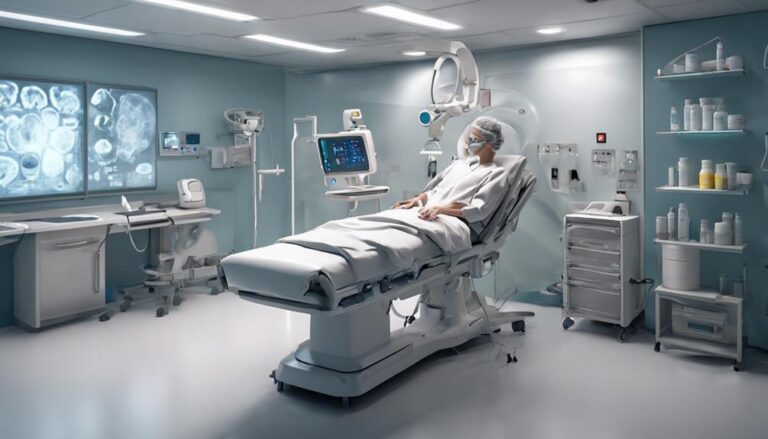Biomedical Engineer Job Description
Biomedical engineers require a minimum bachelor's degree, with some roles necessitating a master's or a PhD for specialized positions. They conduct research, design medical devices, perform rigorous testing, and oversee projects. Skills needed include technical expertise, strong analytical abilities, and excellent communication. The work environment is collaborative, with access to advanced technology. Career opportunities span pharmaceuticals, research institutions, hospitals, etc., with room for growth into leadership roles. Salary negotiation strategies impact earnings, and future trends show a promising 7% growth. This role is vital in healthcare technology innovation.
Key Takeaways
- Conduct research to innovate and improve medical devices.
- Design detailed prototypes for medical devices.
- Perform rigorous testing procedures for functionality and safety.
- Oversee projects from conception to completion.
- Strong analytical skills and proficiency in project management are essential.
Educational Requirements
When pursuing a career as a biomedical engineer, obtaining a minimum of a bachelor's degree in biomedical engineering or a related field is typically required. This educational foundation equips individuals with the necessary knowledge and skills to excel in the field of biomedical engineering. Beyond the undergraduate level, some positions may necessitate a master's or doctoral degree, particularly for more specialized or advanced roles.
Biomedical engineers have diverse career paths available to them, including opportunities in research, product development, clinical engineering, and academia. The industry demand for biomedical engineers continues to grow steadily due to advancements in healthcare technology and the increasing focus on improving medical devices and procedures. This demand is driven by the need for innovative solutions to healthcare challenges, making biomedical engineering a promising field for those interested in combining engineering principles with healthcare applications. Pursuing higher education or gaining specialized certifications can further enhance career prospects and open doors to more advanced positions within the industry.
Job Responsibilities
In the field of biomedical engineering, professionals are tasked with a wide range of job responsibilities that encompass the design, development, and testing of medical devices and systems. This multifaceted role requires individuals to stay abreast of industry demand and technological advancements to guarantee the efficacy and safety of medical equipment.
Key responsibilities include:
- Research and Development: Conducting research to innovate and improve medical devices based on industry demand and user needs.
- Design and Prototyping: Creating detailed designs and prototypes of medical devices, considering factors such as usability, cost-effectiveness, and regulatory compliance.
- Testing and Evaluation: Performing rigorous testing procedures to validate the functionality, reliability, and safety of medical devices.
- Project Management: Overseeing projects from conception to completion, coordinating interdisciplinary teams, managing budgets, and ensuring timelines are met accurately.
The role of a biomedical engineer requires a keen eye for detail, strong analytical skills, and proficiency in project management to contribute effectively to the healthcare industry.
Key Skills and Qualifications
To excel in the field of biomedical engineering, possessing a combination of specialized skills and specific qualifications is essential. Biomedical engineers are expected to have a strong foundation in both engineering principles and biological sciences. Additionally, they should possess excellent analytical and problem-solving skills to innovate and create solutions in the healthcare industry. Here are the key skills and qualifications necessary for a successful career in biomedical engineering:
| Skills | Qualifications | Additional Requirements |
|---|---|---|
| Strong technical | Bachelor's degree in | Industry experience |
| and analytical | Biomedical Engineering | in a related field is |
| skills | or related field | often required |
| Excellent | Master's or PhD in | Participation in research |
| communication | Biomedical Engineering | projects during studies |
| and teamwork | or related field | can be advantageous |
| skills |
Combining these skills with relevant qualifications and industry experience can pave the way for a successful career in biomedical engineering. Participation in research projects can also provide valuable hands-on experience and help in staying current with advancements in the field.
Work Environment
The work environment of a biomedical engineer is characterized by a dynamic interplay between cutting-edge technology and intricate biological systems. This unique setting offers a blend of challenges and opportunities for professionals in this field. Here are some key aspects of the work environment for biomedical engineers:
- Collaborative Projects: Biomedical engineers often work on interdisciplinary teams, collaborating with professionals from diverse backgrounds such as doctors, scientists, and other engineers. This collaborative approach allows for the integration of different expertise to solve complex problems efficiently.
- Cutting-Edge Technology: In this environment, biomedical engineers have access to state-of-the-art equipment and tools to conduct research, design medical devices, and develop innovative solutions for healthcare challenges.
- Team Dynamics: Effective teamwork is essential in the work environment of biomedical engineers. Team dynamics play a critical role in driving innovation, problem-solving, and achieving project milestones.
- Research Opportunities: The work environment provides ample opportunities for research and development, allowing biomedical engineers to explore new technologies, conduct experiments, and contribute to advancements in the field of healthcare.
Career Opportunities
Career opportunities for biomedical engineers encompass a diverse range of paths that leverage their expertise in merging technology with biology to drive advancements in healthcare. The industry demand for biomedical engineers is steadily increasing due to the growing need for innovative medical solutions and devices. Biomedical engineers can explore opportunities in various sectors such as pharmaceuticals, medical devices, research institutions, hospitals, and government agencies.
Moreover, biomedical engineers have excellent career advancement opportunities. They can progress into leadership roles such as project managers, research directors, or department heads. With experience and further education, biomedical engineers can specialize in areas like biomechanics, tissue engineering, or medical imaging, opening doors to advanced positions and higher salaries. Additionally, pursuing certifications or advanced degrees can enhance their skill set and marketability, leading to expanded career prospects.
Salary Outlook
When considering the salary outlook for biomedical engineers, key points to examine include:
- The average annual earnings within the field
- Various factors that can influence salaries such as experience and location
- Potential future salary trends
Understanding these aspects can provide valuable insights into the financial landscape of this profession and help professionals make informed decisions about their career paths.
Average Annual Earnings
On average, biomedical engineers can expect to earn a competitive annual salary in line with the specialized nature of their work. When considering salary comparison and earnings potential, the following key points are worth noting:
- Median Salary: The median annual wage for biomedical engineers is around $91,410, reflecting the industry's recognition of their valuable skills.
- Top Earners: Top earners in this field can command salaries exceeding $118,730 per year, showcasing the potential for substantial financial rewards.
- Industry Variances: Salaries may vary based on the specific industry of employment, with pharmaceutical and medicine manufacturing typically offering higher pay scales.
- Experience Impact: Accumulated experience can significantly influence earnings, with seasoned biomedical engineers earning more than entry-level professionals.
Factors Influencing Salaries
Factors influencing salaries for biomedical engineers encompass a variety of variables that can shape the earning potential within this specialized field. Salary negotiation strategies play a vital role in determining the income levels of biomedical engineers, with those skilled in negotiating often securing higher pay packages.
Market demand for biomedical engineers also heavily impacts salaries, with industries experiencing high demand for these professionals typically offering more competitive compensation packages. Additionally, holding industry-specific certifications can lead to increased earning potential as employers value specialized skills and expertise.
Furthermore, the geographic location where a biomedical engineer works can greatly impact their salary, as certain regions or cities may offer higher wages due to cost of living or demand-supply dynamics in that area.
Future Salary Trends
Anticipated advancements in technology and increasing demand for specialized skills are expected to drive future salary trends for biomedical engineers. Salary projections indicate a promising outlook for professionals in this field, with an estimated growth of 7% over the next decade, outpacing the average for all occupations.
This growth is attributed to the expanding role of biomedical engineers in various industries, including pharmaceuticals, medical devices, and research institutions. Additionally, the income potential for experienced biomedical engineers is projected to be significantly higher than for entry-level positions, with opportunities for advancement into managerial or specialized roles.
As the healthcare industry continues to evolve, biomedical engineers with advanced degrees and certifications are likely to command even higher salaries.
Job Outlook and Growth
The projected growth of the biomedical engineering field indicates a promising job outlook for professionals in this sector. Industry trends suggest a continuous rise in demand for biomedical engineers due to advancements in healthcare technology and an aging population driving the need for innovative medical solutions. This increasing market demand opens up abundant employment opportunities for individuals pursuing a career in biomedical engineering.
As the healthcare industry evolves, biomedical engineers play an essential role in developing cutting-edge medical devices, equipment, and procedures. This pivotal role guarantees that biomedical engineers will continue to be sought after in various sectors, including pharmaceuticals, research institutions, hospitals, and medical device companies. With the constant evolution of technology and the growing emphasis on healthcare innovation, the career advancement prospects for biomedical engineers are promising.
Conclusion
In summary, biomedical engineers are the architects of the human body's infrastructure, designing and implementing innovative solutions to improve healthcare.
With a strong foundation in science and technology, they play a pivotal role in advancing medical research and treatment.
By blending creativity and precision, biomedical engineers are the driving force behind cutting-edge developments in the field.
Their work is essential in shaping the future of healthcare and improving the quality of life for individuals worldwide.







